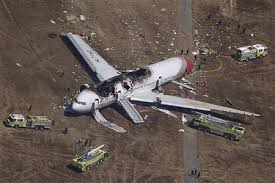
Washington, Jul 7: Three Indians were on board the ill-fated Asiana Airlines flight which crashed landed at the San Francisco airport, killing two people and injuring more than 180, officials said today.
The tail ripped off the airplane as it was touching down on the San Francisco airport runway about 11:30 am local time yesterday after arriving from Seoul, Federal Aviation officials said.
Ten passengers were said to be either in serious or critical condition, they added.
The Asiana Airlines flight en route from Seoul had 291 passengers on board and had 16 crew members.
The Indian Ambassador to South Korea, Vishnu Prakash, said there were three Indian passengers on board the Asiana Airlines from Seoul to San Francisco. One of them suffered collar bone fracture.
"ASIANA mishap at SFO: 3 Indians on board too. 1 suffered collar bone fracture and other minor injuries. Wish ASIANA gives out complete info," Prakash said on Twitter, the micro blogging site.
Majority of the passengers were comprised of 77 Korean citizens, 141 Chinese citizens, 61 US citizens, one Japanese citizen, etc., Asiana Airlines said in a statement. Evacuation slides were used for the passengers to escape the burning flight.
Soon after the plane crash, US President Barack Obama was made aware of the incident by Lisa Monaco, Assistant to the President for Homeland Security and Counter terrorism.
"The President will continue to be updated as new information becomes available. The President expressed his gratitude for the first responders and directed his team to stay in constant contact with the federal, state and local partners as they investigate and respond to this event.
"His thoughts and prayers go out to the families who lost a loved one and all those affected by the crash," the White House said. The National Transportation Safety Board (NTSB) has launched a full go-team to San Francisco, to investigate the crash.
"The crash occurred while the aircraft was landing at San Francisco International Airport," the board said in a statement. "We have not determined what the focus of this investigation is yet. Everything is on the table at this point.
"The team will include people focused on operations; human performance; survival factors; airport operations; and aircraft systems, structure and power," the NTSB chairwoman, Deborah Hersman, told reporters in Washington.
"Asiana Airlines is currently investigating the specific cause of the incident as well as any injuries that may have been sustained to passengers as a result," the airlines said in a statement.
Extending its deepest condolences to the families and friends of those who perished in the accident and wishing for the recovery of those injured, Boeing said it will join the NTSB at their request to provide technical assistance to their investigation.
Some of the passengers recounted their harrowing tale of the incident. "All of a sudden, boom, the back end just hit and flies up into the air and everyone's head goes up the ceiling," Elliott Stone, one of those on the flight told the CNN.
Some of the videos posted on You Tube by eyewitness showed the plane engulfed in plane and people sliding out of the plane and running for safety. "I just crash landed at SFO," read the message from David Eun. According to eye witnesses the plane's tail struck the ground first, and then the aircraft braked suddenly and spun around.
"It flipped... hit the ground," said a teenage boy who was on aboard the flight.
As a result of the crash landing, the San Francisco airport was shut down and planes were diverted to the nearest airports, most of them to the busy Los Angeles airport.
Facebook's chief operating officer, Sheryl Sandberg, said that she and her family were booked on the Asiana flight that crashed, but they switched to a United Airlines flight to get frequent-flyer miles.
"Taking a minute to be thankful and explain what happened. My family, colleagues Debbie Frost, Charlton Gholson and Kelly Hoffman and I were originally going to take the Asiana flight that just crash-landed. We switched to United so we could use miles for my family's tickets," she wrote on her Facebook page.
"Our flight was scheduled to come in at the same time, but we were early and landed about 20 minutes before the crash. Our friend Dave David Eun was on the Asiana flight, and he is fine," she wrote.





Comments
Add new comment